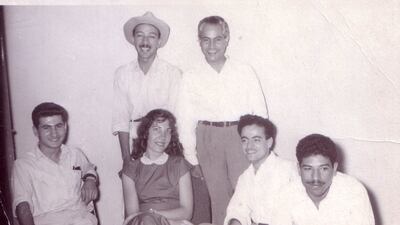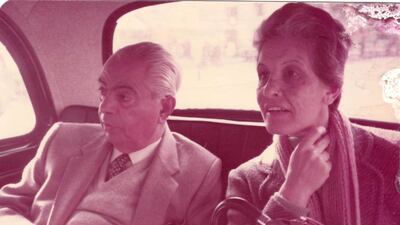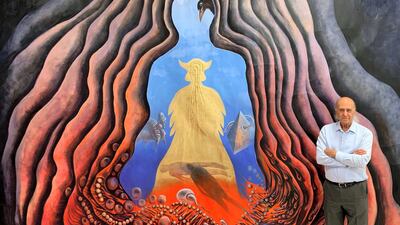Friends of Iraqi poet Muthaffar Al Nawab mourned his death and described it as a great loss.
Al Nawab died at the age of 88 at University Hospital Sharjah after a prolonged illness.
The news marks the end of an eventful life in which his roles spanned those from a teacher, critic and civil servant to a prisoner and exile.
“I'm deeply saddened by this loss, it is irreplaceable. He gave up his life not only for Iraq but for Palestine and the Arab region,” Suhaila Derwish, 85, widow of Iraqi artist Hafidh Aldroubi, one of the founders and pioneers of modern Iraqi art, told The National.
“He was one of my husband’s students and closest friends. My husband considered him a son.”
Ms Derwish described their relationship with Al Nawab as deep and strong and said he visited their home in Baghdad almost every day.
Her house was the first place the poet went after escaping prison in Iraq by digging a tunnel.
“The last time I saw him in Iraq was in the 70s after he escaped from Al Hilla prison, and then I met him in Beirut by coincidence,” she said.
Ms Derwish flew from London to Beirut in 2011 just to see him.
“We greatly valued him. My aunt who went to university with him flew from Baghdad and I came from London to see him, but he wouldn’t meet anyone,” she said.
The poet, who won many generations of admirers with work that evoked the pain of Arab people because of political conflicts, the occupation of Palestine, and displacement of millions, lived in Sharjah for nearly a decade.
“Sharjah was his home for probably more than 10 years, and I do highly respect the entity that provided him with health care when unfortunately his home country did not,” Ms Derwish said.
“Muthaffar wanted a world where there is only peace, love and serenity, and I am saddened by the news of his death.”
Iraqi painter, sculptor and plastic surgeon Ala Bashir, 83, said he had known the poet since 1958 and paid tribute to him.
“We were both members in the Iraqi impressionist group headed by late artist Hafidh Aldroubi,” Mr Bashir said.
The two remained in contact for years but the poet’s rapidly deteriorating health made it difficult to talk to him.
“But I was in touch with his helper Hazim Al Sheikh and continued following up on his health until his death,” Mr Bashir said.
“Muthaffar was not only a great poet and thinker but a great friend. He was kind, honest, and first to help.”
“There is no doubt he will be deeply missed. He is one of those who are difficult to replace.”
Ali Al Ameri, a Palestinian Jordanian poet, and editorial manager of the Arabic edition of Publishers Weekly published by Sharjah Book Authority in the UAE, said Al Nawab was a symbol of rejection.
“He used poetry to talk for and on behalf of the poor and the oppressed. His poems were distinguished in terms of character and his eloquent words mocked the oppression of governments,” he said.
“Despite living in exile from one country to another, he remained an icon of freedom and justice and a voice supporting the liberation of Palestine.”
Al Nawab was born in Baghdad in 1934 and did not marry. His talent for poetry was evident from an early age and he received fame for his powerful revolutionary poems.
He graduated from the University of Baghdad and worked as a teacher before being expelled from the country. He was imprisoned for political reasons in the 1950s.














